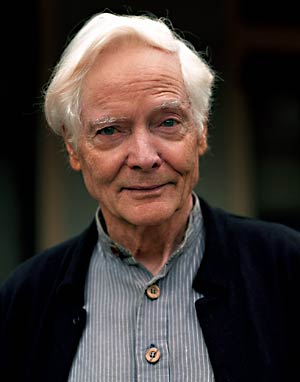
To his two Pulitzer Prizes and his National Book Award, poet W.S. Merwin can add one more prize: United States poet laureate.
The Library of Congress announced Thursday that the much-lauded poet will follow Kay Ryan as the nation’s 17th laureate. Although the post comes with an annual salary of $35,000, it has no formal requirements, but it is presumed to bring poetry more to the forefront in American culture.
“I always shied away from commitments to Washington — I like living in Hawaii,” said Merwin, 82, from his home on Maui. “I generally make a couple of trips a year and do some readings, but I think we worked out a way that this is going to work, and there are some places for it to expand.”
As for the public responsibilities of the position, he says that it will be a challenge: “I don’t have e-mail, and I don’t want it. And I don’t like saying no to people — I do like leading a very quiet life. I’d rather not do sound bites, but have real conversations with people.”
“He is an undeniable presence in the world of poetry,” said Michael Wiegers, executive editor at Copper Canyon Press, who has been Merwin’s editor for 17 years. “It’s a public position, and knowing William as I do, he likes his privacy and protects it. I thought — would he even accept the position? Despite all the awards and accolades, he’s an incredibly humble man.”
Merwin was born in New York and grew up in New Jersey and Pennsylvania. He attended Princeton University, where he studied with poet John Berryman. He moved to Hawaii in 1976 to study Zen Buddhism, and he has lived there ever since. His embrace of Buddhism and Hawaii are reflected in his poetry.
He lives with his third wife, Paula Schwartz, on a former pineapple plantation, where he has spent years restoring the property and raising endangered palm trees. The plantation has more than 700 palms that he planted, some of them very rare. “I think the natural world is what is right in front of you,” Merwin said. “You don’t have to go to natural parks or something, just look in your backyard and you’ll find plants and bugs.”
When Merwin was very young, he met poet Ezra Pound, who suggested he take up translation, which he did. And despite his long career as a poet, those beginnings seem to still be a part of him. Wiegers says that at a recent fundraiser that featured Merwin reading his poetry, an intern was handing out name tags to guests. She handed one to Merwin that read, “W.S. Merwin, poet.” “He looked at it,” Wiegers said, “and said, ‘I wish it had said translator.’ “
The son of a Presbyterian minister, Merwin began writing hymns at age 5 and decided to become a poet in college. “It was impossible to think of being a poet then,” he said, “much weirder than it is now.”
As poet laureate, Merwin would like to make poetry more accessible to the public and help people rediscover their joy of verse. “Most people you bump into on the street will tell you they never read poetry,” he said, “and if you ask them why they’ll say they don’t understand it. I tell them, don’t worry about understanding it, listen to it for pleasure. Very often all people have to do is hear it — if they hear poetry, they get it.”
That, Merwin added, is why he eventually stopped using punctuation in his poetry. “The moment you drop the punctuation,” he explained, you have to hear it. So many times people said to me they didn’t get anywhere with my poetry until they read it out loud.”
James Billington, the Librarian of Congress who ultimately chooses the poet laureate, notes that part of what makes Merwin’s work unique is not only his love of nature and vast knowledge of history and mythology, but also how he incorporates those subjects into his poetry.
“His poetry,” Billington said, “is a rich mix of influences all put together in a very original way and profound poetic style. I think he’s reached a stage where he’s almost universally admired. His poetry continues to grow and, and I think his poet laureateship will broaden the audience for poetry.”
Source: Los Angeles Times




